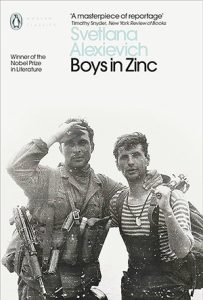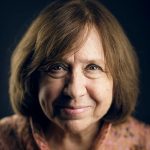Boys in Zinc

Author: Svetlana Alexievich
Translator: Andrew Bromfield
Publisher: Penguin Books
Year of Publication: 1989 (First edition), 2017 (This version)
Print Length: 304 pages
Genre: Non-Fiction / Journalism, History
Area: Soviet Union, Afghanistan
Topic: History, Lived Experience, Testimonies, Peace, Emotions & Feelings, Family, Friendship & Companionship, War, War Veteran
Haunting stories from the Soviet-Afghan War from the winner of the Nobel Prize in Literature
– A new translation of Zinky Boys based on the revised text –
‘I was trying to present a history of feelings, not the history of the war itself.’ ‘Is the word “Motherland” just a meaningless term to you? We did what the Motherland asked of us’
From 1979 to 1989 Soviet troops engaged in a devastating war in Afghanistan that claimed thousands of casualties on both sides. While the Soviet Union talked about a ‘peace-keeping’ mission, the dead were shipped back in sealed zinc coffins. Boys in Zinc presents the honest testimonies of soldiers, doctors and nurses, mothers, wives and siblings who describe the lasting effects of war.
Weaving together their stories, Svetlana Alexievich shows us the truth of the Soviet-Afghan conflict: the killing and the beauty of small everyday moments, the shame of returned veterans, the worries of all those left behind. When it was first published in the USSR in 1991, Boys in Zinc sparked huge controversy for its unflinching, harrowing insight into the realities of war.
Table of Contents
Prologue
From the Notebooks
Day One: ‘For many shall come in my name…’
Day Two: ‘And another dieth in the bitterness of his soul’
Day Three: ‘Regard not them that have familiar spirits, neither seek after wizards…’
Post Mortem
Boys in Zinc on Trial: A History in Documents

Svetlana Alexievich is a Belarusian journalist and a prose-writer. She was born on May 31, 1948 in the Ukrainian town of Ivano-Frankovsk into the family of a serviceman. Her father was Belarusian and her mother Ukrainian. After her father’s demobilization from the army, the family returned to his native Belarus and settled in a village where both her parents worked as schoolteachers. After finishing school, Alexievich worked as a reporter on the local newspaper in the town of Narovl, Gomel Region. She received her degree at Department of Journalism of Minsk University, there winning several awards and competitions for scholarly and student papers. One of a minority of laureates recognized as a dedicated writer of nonfiction, Alexievich devised a hybrid literary genre that evolved as “the closest possible approximation to real life,” wherein human voices were allowed to speak for themselves about the main events of the age
Source: https://www.nobelprize.org/prizes/literature/2015/alexievich/biographical/ & https://www.britannica.com/biography/Svetlana-Alexievich
More from Svetlana Alexievich in this library, click here.
